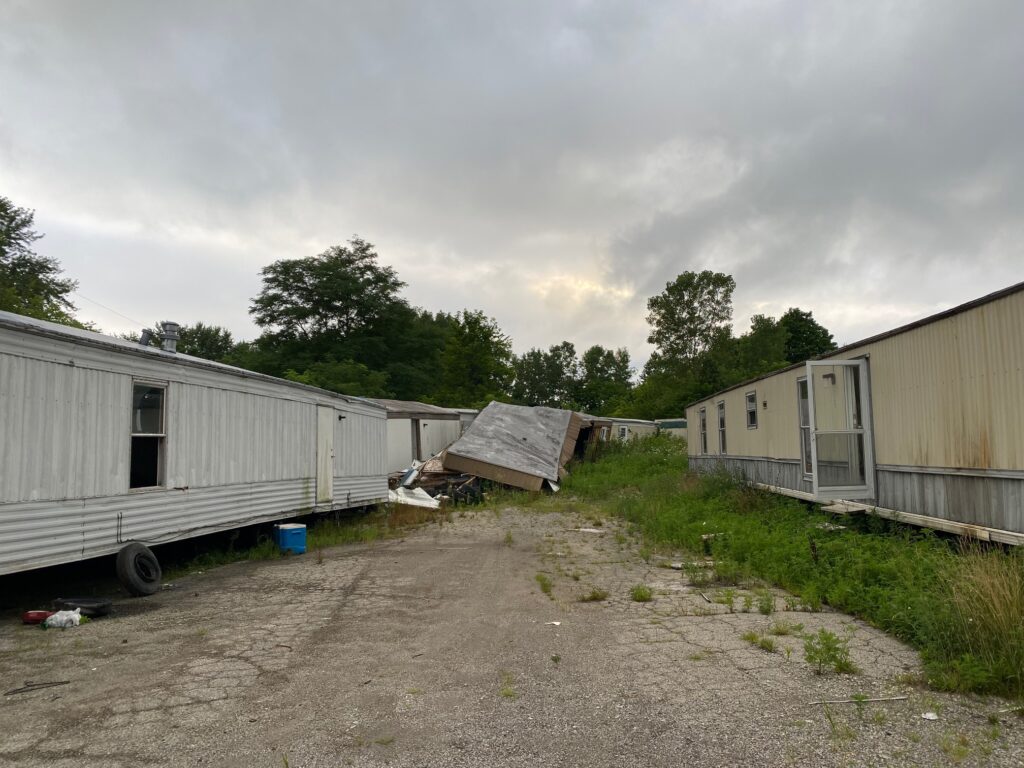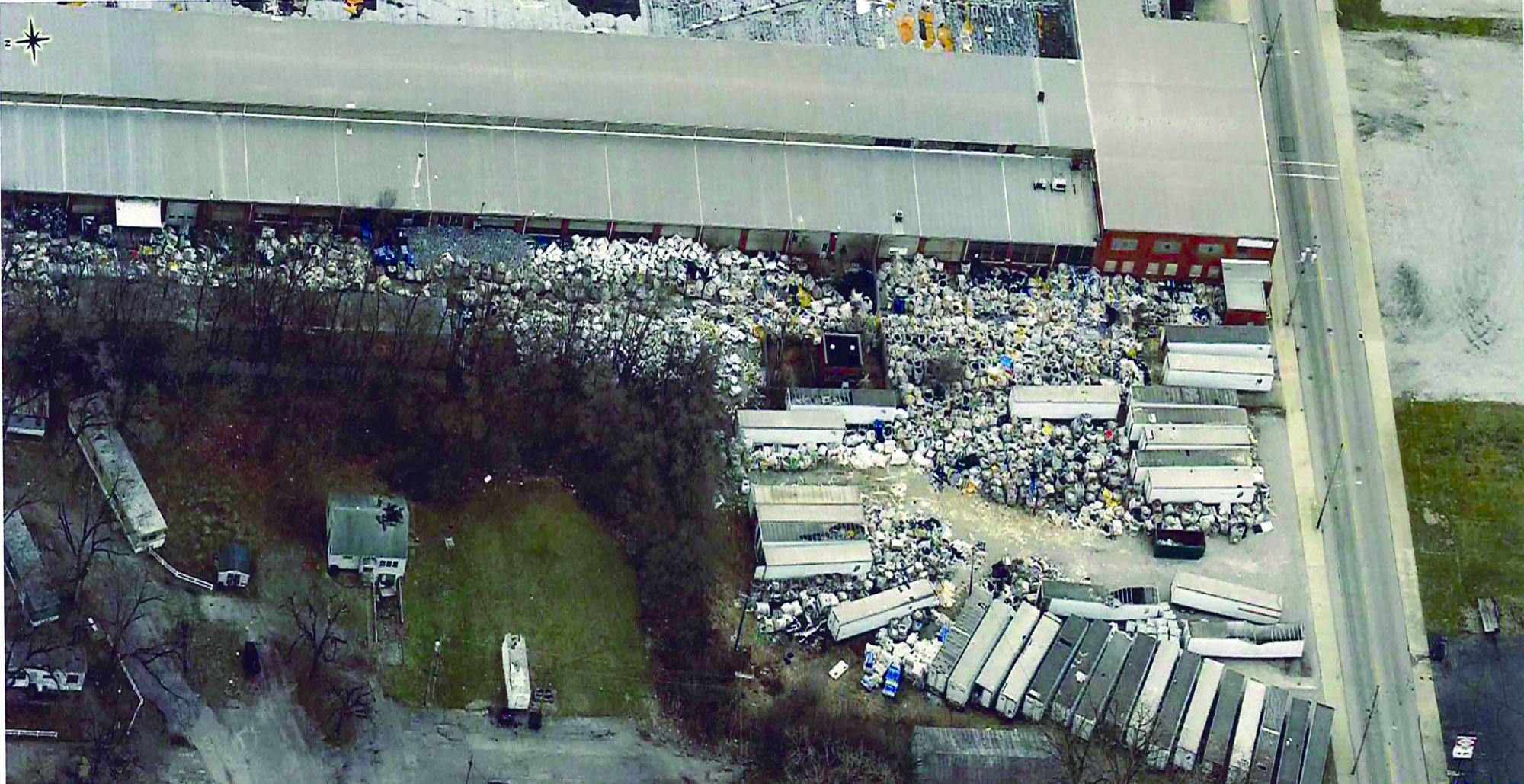Mayor Dave Snow made one point “crystal clear,” as he said, when speaking about the conundrum the city faced with plastics-filled properties on North West F Street that were a known fire hazard: Taxpayers would not pay the multimillion-dollar cleanup tab.
The city had been working with Seth Smith, the owner of Cornerstone Trading Group, for Smith to clear the property truckload by truckload. The long-range plan was interrupted by the April 11 inferno that burned Cornerstone’s plastics and the 13.8-acre, three-property complex. Snow said Smith was “negligent” and “irresponsible” for accumulating so much plastic and for ignoring Unsafe Building Commission and court orders to improve the situation.
But Smith is just the latest business or property owner, both small and large, in the area to ignore deteriorating property or abandon property altogether.
And, yes, taxpayers generally end up paying the bills — from demolishing the former Reid Hospital on Chester Boulevard to last year’s demolition of 916-918 E. Main St. to a growing list of cleanups and demolitions at residential properties.
A history of taxpayer-funded cleanups
Since the beginning of January 2021, the city’s Board of Public Works and Safety has approved contracts for cleanup or demolition work on nearly 70 properties at a cost of more than $1.2 million. That includes $512,768.62 alone for the 916-918 E. Main project and another $189,855 for the burned former Hagerstown Plastics site.
That’s not the only way taxpayers pay the price. Delinquent property tax bills on many of these properties force Wayne County residents, most of whom received steeper bills this year anyway, to cover those costs or accept decreased funding for county, city and township government as well as Richmond Community Schools and Morrisson-Reeves Library.
Can anything be done to help local governments better hold property owners accountable for delinquent tax payments and deteriorated property? Or to prevent these cases from occuring in the first place?
“I don’t know of a magic wand to wave to eliminate the possibility of these egregious situations,” said Ron Cross, the county’s attorney.
Cross helped earn $1,362,584.84 judgments against Bob Ciprietti and Ernesto Zamparini, the principals of Spring Grove Development, the limited liability company that owned the former Reid Hospital site after Reid moved to its new campus. That judgment was for the property tax bill when the city took control of the abandoned property to demolish the buildings.
Ciprietti eventually negotiated and paid a $75,000 settlement, but Zamparini, whose location is unknown, still owes the county. Cross said mechanisms exist to enforce the judgment, but collection depends on finding him and his ability to pay.
Still, that payment would only address tax liability. The city, county and Reid collaborated to pay demolition costs. Renascent Inc. won the demolition contract with a bid of nearly $3.5 million. The city and county spent money that could have been used in other ways.
“Obviously we would rather not spend it on blight elimination, but some things are so glaring that they really need to be addressed, and when we can collaborate with communities, we try to do that,” said Commissioner Jeff Plasterer, who was a county council member at the time.
The North West F Street properties created another egregious situation. Smith only owned 308 N.W. F St., but he occupied the abandoned properties at 358 N.W. F St., the former Hoffco site, and 310 N.W. F St. Owner AFG Investment Fund LLC of California accumulated a $601,873.25 property tax bill until the city took control of the properties through tax sale procedures governed by state statute.
Limited options for recouping costs
When a property owner misses three consecutive property tax payments, the property becomes eligible for a tax sale. If the property sells, the owner has a year, unless it’s an abandoned property, to reclaim the property. Properties that don’t sell have a certificate of purchase issued that allows the county commissioners to receive a tax deed and put properties in a commissioners or deed sale, if they choose. If the property does not sell there, however, the commissioners become responsible, so they carefully select the properties for which they assume ownership, letting others such as the former Reid property and the North West F properties sit.
“It’s difficult to provide a clear solution to the problem of an owner abandoning a property and letting it deteriorate,” A.J. Sickmann, the city’s attorney, wrote in an email responding to WWN questions. “Creating more local control in these situations, given the impact on communities, makes sense and is worth a conversation with lawmakers.”
Tax and deed sales offer a future benefit, but do not necessarily help with what’s owed. When commissioners take possession, the taxes owed are wiped away for future owners, but the tax obligation remains with the owner who accumulated the debt.
“The whole goal of the tax sale system and the commissioners’ certificate purchase and/or deed sale, which is what we do, is to get the property back on the tax rolls,” Cross said.
When the city develops an end game, such as with the former Reid site, the commissioners can use a quitclaim deed to transfer a property’s ownership to the city. This happened with the Reid site, the 358 N.W. F and 310 N.W. F sites and many residential properties, including those in the city’s grant-funded Blight Elimination Program that demolished more than 200 deteriorated properties.
“One of the real success stories, I think, is how we collaborated with the city when they had money to do blight elimination, and so a significant number of those houses that were able to be torn down were houses that the county was able to take time to transfer title to the city for those demolitions,” Plasterer said. “And we did some good there, and we had help to do that, but that help does not always exist.”
Snow has bulked up the city’s code enforcement department, and the city uses its Unsafe Building Commission to some effect. Those entities issue citations or orders demanding properties be improved, but other than fines, there’s little to be done to enforce the orders under current law.
Smith and Cornerstone received orders back in 2019. At that point, the city recognized the properties Cornerstone occupied as fire hazards, partially because of the amount of plastics stored there. Smith challenged the orders in court, and Judge David Kolger affirmed them. However, no progress had been made when the city took ownership in March 2021.
The city paid $12,850.20 for an initial environmental study, then Cornerstone and the former Warfield Oil and Hagerstown Plastics properties were included in an EPA Brownfields Assessment at the cost of $230,688.
Legislative fixes needed
Sickmann believes the recent fire was preventable. “I want to be clear that proactive efforts were ongoing to create a solution,” Sickmann wrote about the Cornerstone properties, adding that “the city worked to get products out of the site by stopping the owner from bringing in more materials and demanding he sell off existing products, with truckloads leaving the site on a weekly basis. The fire at the recycling facility was certainly an unfortunate situation, but it was not ‘inevitable,’ as some have said.”
State law enables the city to take on remediation or demolition if a property owner fails to do so; however, the city must pay, then try to seek reimbursement, which often is unlikely to happen. The city can put a lien on the property for the costs or add them to the property tax bill.
“I would welcome state legislation that provides local government with more teeth enforcing code violations, but it is a difficult problem to solve, and local officials use all the legal tools at their disposal,” wrote Sickmann, noting that municipalities would likely welcome federal funding for such situations.
The Spring Grove Development and Cornerstone situation also highlight three other problematic issues: limited liability corporations (LLCs), convoluted ownership and absent ownership. LLCs allow a business owner to protect personal assets should the business fail, preventing a lawsuit from going after an owner’s personal checking account, for example, when the business doesn’t have enough money to pay its bills. That encourages business development, but limits what creditors, such as the city or county, can recover when a business owner acts irresponsibly.
Sickmann indicated that he’s not aware of any state enforcement measures that dictate LLCs implement property maintenance requirements.
“A possible legislative solution might be that if a property owned by an LLC falls into disrepair and requires government intervention, individual members of that company could be held accountable,” he wrote.
Other situations can become complicated because of the ownership situation. In the Cornerstone instance, AFG owned two of the properties Smith occupied, and First Bank Richmond essentially owned Smith’s inventory as collateral for a loan.
Failed contract sales also have created problems. The city and county recently split the $30,384 cost of cleaning abandoned mobile homes from the property at U.S. 35 and Salisbury Road. Palm Harbor Villages of Phoenix, Arizona, was selling the property to a local man, who eventually was incarcerated. The company did not know dilapidated mobile homes had been placed on the property, and when they learned, they paid the property tax but refused to contribute to the cleanup.

A failed contract sale resulted in a lawsuit about ownership of the Crain Sanitarium building at the corner of East Main and North 22nd Streets. The city paid for demolition of a dangerous porch on the property, and the county has opted not to take ownership and place the property in its deed sale. Therefore, the property continues to sit and deteriorate.
Sickmann noted that ownership structures do make situations more difficult with the seller placing blame on the buyer.
“When the nature of the code violation becomes so severe, we have seen out-of-state property owners simply let the property go to tax sale, which is what seems to have occurred at the recycling facility,” he wrote.
County property records show the properties for which the city has paid to clean up or demolish have owners in Indianapolis, Markleville, Fishers, Norman, Selma and Winchester in Indiana and in Iowa, Washington, West Virginia, Idaho, Arizona, Ohio, Texas and Oregon. Together the city has spent nearly $175,000 on those owners’ properties.
The problem significantly impacts Richmond, but it’s not something seen in Westfield or Fishers, Cross said, maybe because those areas have better adapted to a service-oriented economy rather than a traditional Rust Belt economy.
Cross said the state legislature took a small step to help local governments when it shortened the time a property owner has to redeem an abandoned property sold at a tax sale. That enables the new owner to take control without waiting a year.
“It’s politically popular at the local level, but I think it’s hard to get the General Assembly excited about razing properties in cities and towns that have economies that aren’t exactly flourishing, and no one seems to be politically pushing that button,” he said.
Snow and Sickmann have said they’ll pursue avenues to hold Smith financially accountable for the fire costs and for cleaning up the destroyed properties.
History suggests that check may never be written, but if they succeed it would give taxpayers at least some relief.
A version of this article appeared in the April 26 2023 print edition of the Western Wayne News.

